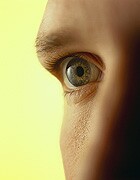- Double Mastectomy May Offer No Survival Benefit to Women With Breast Cancer
- Toxic Lead Found in Cinnamon Product, FDA Says
- Certain Abbott Blood Sugar Monitors May Give Incorrect Readings
- Athletes Can Expect High Ozone, Pollen Counts for Paris Olympics
- Fake Oxycontin Pills Widespread and Potentially Deadly: Report
- Shingles Vaccine Could Lower Dementia Risk
- Your Odds for Accidental Gun Death Rise Greatly in Certain States
- Kids From Poorer Families Less Likely to Survive Cancer
- Tough Workouts Won’t Trigger Cardiac Arrest in Folks With Long QT Syndrome
- At-Home Colon Cancer Test Can Save Lives
Is He the Impatient Type? Check His Eyes


People with fast eye movements tend to be less patient and more likely to make impulsive decisions, a new study contends.
Assessing body movement, including the speed of the eyes as they focus on one thing and then another, helps reveal how a person’s brain evaluates the passage of time in relation to the value of a potential reward, the Johns Hopkins University researchers said.
“When I go to the pharmacy and see a long line, how do I decide how long I’m willing to stand there?” principal investigator Reza Shadmehr, a professor of biomedical engineering and neuroscience, said in a university news release. “Are those who walk away and never enter the line also the ones who tend to talk fast and walk fast, perhaps because of the way they value time in relation to rewards?”
Having a better understanding of how people evaluate time when making decisions might help explain why malfunctions in certain areas of the brain make decision-making harder for people with brain injuries or neurological disorders like schizophrenia, the researchers said.
For the study, published this week in the Journal of Neuroscience, researchers conducted a series of experiments with volunteers and found a strong correlation between eye-movement speed and patience or impulsivity.
“It seems that people who make quick movements — at least eye movements — tend to be less willing to wait,” Shadmehr said.
“Our hypothesis is that there may be a fundamental link between the way the nervous system evaluates time and reward in controlling movements and in making decisions,” Shadmehr said. “After all, the decision to move is motivated by a desire to improve one’s situation, which is a strong motivating factor in more complex decision-making too.”
More information
The American Academy of Child & Adolescent Psychiatry talks about teens and decision-making.
Source: HealthDay
Copyright © 2024 HealthDay. All rights reserved.










